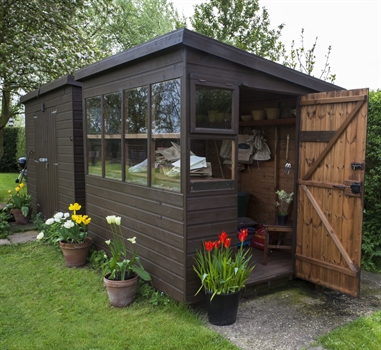A shed can be a handy space for tasks like potting bulbs and houseplants, or making repairs or pursuing a hobby such as woodwork. Or it can be a place to stash items that you don’t want around the home so that they are out of sight, out of mind.
Are sheds good for storage?
Well, yes, sheds can be used to store domestic goods. However – sheds and outbuildings are often not heated or insulated, so the temperature and humidity will fluctuate depending on the weather. This means that sheds and outbuildings are not the best for storing domestic goods, as those changes in temperature can play havoc with your items.
For instance, condensation can affect electronic items; and changes in temperature can cause furniture to warp. Poorly stored books, papers and magazines can be affected by damp, too. But not to worry – there is a better place to keep climate sensitive items.
What would you like to use your shed for?
Rather than using your shed as a catch-all for clutter, ask yourself if it is the best place for whatever it is you’re about to store in there. If the item is likely to deteriorate under shed conditions, it would be better to either get rid of it, or put it into a dry, temperature-controlled storage unit. And if it’s not something you’ll be using in or near your shed, perhaps it would be better stored elsewhere.
It’s fine to keep things ‘just in case’, but if you’ve had an item that is broken or unfixable for more than a couple of years, then it may be time to take it to the tip.
Sheds and seasonal items
When autumn comes around, the shed is an obvious place to store garden games like croquet or boules, power tools and outdoor furniture. But in colder weather the shed comes into its own. By decluttering your shed, you’ve given yourself a sheltered spot that is out of the wind and rain where you can get on with a few tasks, or just sit for a while.
Sheds are also notoriously vulnerable to thieves and if you’ve treated yourself to some decent power tools, it may be better to overwinter them in a lock-up with good security. Your household insurance may not cover things in your shed – but your self-storage insurance will cover anything like a lawnmower or a hedge trimmer that is kept in your storage unit. To make sure you’re not overpaying for insuring your stored goods, get a quote from Store and Insure.
Organise your tools in a shed
A quick search online will turn up plenty of ideas for organising your tools in a shed or outbuilding. Many people, including IKEA Hackers, swear by pegboard for tools. But shelving, hooks, wooden pegs and large containers are all well suited to sheds.
Furnishing your shed
Local buy and sell groups often have furniture too battered for the house but that is being given away because it might ‘do someone a turn’. Shelves and units in this condition are perfect for a shed and will provide work and storage space so you can make the most of your shed. You might even get yourself a chair or a stool to ensure you can work in comfort.
Put your stamp on your shed
A shed is the perfect place to indulge your taste – good or bad because who would be mean enough to judge what goes on in a shed? But there can be a practical side to painting your shed as a coat of wood treatment stain can lengthen the life of your shed; and a coat of pale-coloured paint inside can make the space brighter and improve the lighting for whatever tasks you have in mind.


